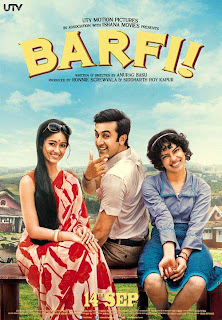When the two main protagonists of a story are deaf-and-dumb
and autistic respectively, what you experience is the sound of silence: the music
that echoes through the cardiac tympanum. Barfi and Jhilmil are two such musicians
who play their chords, silently. Yet they emerge as an orchestra—loud and
heavy! The movie is not a silent one, in the truest sense of the terminology. ‘Cause
the supporting characters speak, shout, laugh, cry: but what you look for is
the soundless melody of Barfi and Jhilmil’s bond. And the man who conducts the
symphony with charming despotism is Anurag Basu.
The entire film goes back and forth on the time scale. And with
that you time travel to Darjeeling and Kolkata of the 70s. The foggy picturesque
landscape of the hills ushers a ‘wow’ out of the audience. The scene where
Barfi sets the camera for his picture is symbolic of the tremendous talent the
cinematography exhibits in the rest of the reel. Be it the green mountains or
the grey roads, be it the Farmville or the wooden house, the camera work is a
delight! Capturing just the eyes of Jhilmil or the ponytail of Barfi, the lenses
marvel the onlooker.
When it comes down to the characterization, you will find it
difficult to feel sympathy for Barfi. He evokes laughter out of you---‘muskaan’
unadulterated. When he eats up a child’s chocolate, you giggle at his prank;
when he holds on to the toy train and rides his bicycle, you say ‘ai shabbash’;
when he hits a post and falls down you caringly hush ‘awwwwwww’. He has this
weird way of conducting a loyalty test. It makes you question yourself---“would
I have passed it?”. Jhilmil does and how! The eyes of the girl speak volumes and
the melancholy in her calling ‘baafffiiii’ outvoices all other sound in the
movie. She is insecure too. Every individual is. But every individual is not
fearless---Shruti is not. But these two entities know how to fly high and take
you along with. And with them flows Pritam’s music—a reminiscent of Late Salil
Chowdhury’s melody!
But the man behind the curtains is the director and
screenplay-writer, Mr. Basu. Kahaani has taken us on a trip to the nooks and
corners of Kolkata---Basu takes us on a holiday ride to the mountains. His screenplay
is, to me, of top notch calibre in this venture. The scene where Barfi
frustrates for the first time as Shruti chooses to be Mrs. Sengupta---out of
this world! The mime speaks of his shouts, silenced. The scene in Kolkata where
Barfi hands over the umbrella, bids bye to Shruti and looks at the car from the door, the scene where
Barfi introduces his home to Shruti and she finds through the window the
presence of another woman, the scene where the light reflected of a mirror hits Barfi and he expectantly turns around : some of the best scenes.
When the lad and the lass play with mirror reflections for the first time, you
are bound to follow the reflections on the ceiling. The ransom note he left has words “ post bosk” and “jai hid” (hind goes missing). The strength of the
script is that it makes you be the character. One frantically searches for
Jhilmil with Barfi with the toy in his mouth, one’s heart leaps with hope as many times as Barfi throws
his shoe up in the air, one actually realises “itni si hasi, itni si khushi,
itna sa tukda chand ka, khwabon ke tinko se, chal banaye aashiyan…”!
One wishes to hold on to the movie with his little
finger, forever. As I come out of the theatre and see the poster that reads “don’t
worry, be barfi!” I feel the director IS asking us to worry— Because we fail to help without a repayment: Because we choke our lives with terms and conditions: Because we do not
love without conditions. Even when we say “I love you unconditionally”, we
limit our expression by mouthing ‘unconditionally’: And finally
because ………we are NOT Barfi!



